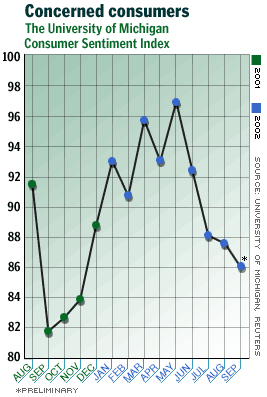NEW YORK (CNN/Money) -
Ignoring a recession, nearly 1.8 million job cuts and other horrors, U.S. consumers have tirelessly spent money in the past year, and much of that spending was fueled by borrowing.
But consumers seem to finally be losing their stomach for debt, meaning they will likely need to see real economic improvement if consumer spending growth is to continue with any strength.
The Federal Reserve said Monday that consumer credit grew in August at the slowest pace in eight months, expanding by only $4.2 billion, disappointing the consensus expectation that credit would grow $11.1 billion, according to Briefing.com.

And the Cambridge Consumer Credit Index, a private monthly survey of more than 1,000 households that measures how consumers feel about taking on debt, fell in October and has been more or less steadily falling since July.
"This month's [survey] data indicate that consumers are trying to keep their credit usage in check," said the survey's chief economist, Allen Grommet. "It is not suggesting that consumers are giving up on using credit, but that they are wanting to slow up and are keeping their debts from growing significantly."
That's good news, in the sense that consumers needed to slow down their borrowing anyway -- the American Bankruptcy Institute says personal bankruptcy filings have risen by 44 percent in the past decade, while credit counseling site Myvesta.org says consumers spend $1.22 for every dollar they earn.
Meanwhile, in the midst of an economic downturn, consumers have been starting to show other signs of the strain of increased debt:
- On Sept. 10, the Mortgage Bankers Association (MBA) said the rate of delinquencies on mortgage loans rose in the second quarter, while mortgage foreclosures were at a record level; and
- On Sept. 26, the American Bankers Association (ABA) said delinquency rates on credit cards, auto loans and mobile homes rose in the second quarter.
"The rise in auto and other consumer loan delinquencies reflects the avalanche of layoffs over the past year and a half," said ABA chief economist James Chessen. "Until job growth gains upward momentum, relatively high levels of delinquencies will remain."
U.S. businesses slashed about 1.8 million jobs from their payrolls during the recession and haven't been in any hurry to hire new workers, leaving the unemployment rate hovering at about the same level since December.
Delinquency and default trends seemed likely to continue in the third quarter, when U.S. stock prices plunged and fears about a potential war in Iraq grew, discouraging U.S. businesses from spending money.
Ordinarily during such a downturn, consumers snap their wallets and pocketbooks shut, saving up money for the next economic boom. That didn't happen this time, in part because of a blisteringly hot real-estate market.
| Related stories
|

|
|
|
|
Plunging mortgage rates pushed demand for homes ever higher, making homeowners feel wealthier and triggering a refinancing orgy that cut mortgagees' monthly payments, putting more spending cash in their pockets and giving them money to pay off some of their debt.
This was critical to the broader economy's strength, since consumer spending fuels about two-thirds of the total U.S. economy, the world's largest.
"The Queen of England mistakenly knighted Alan Greenspan as the saviour of the global economy," PIMCO bond fund manager Bill Gross said in a note last week. "She should have instead tapped the originator of the refinancable mortgage."
But, in that same note, the ever-gloomy Gross also raised the question: What happens when the refi boom ends before the economy gets back on its feet and businesses start hiring again?
Disaster was the answer, though Gross said he thought such a scenario was still unlikely -- for now.
In any event, though it might not happen any time soon -- applications for refinancing hit a new record last week, according to the MBA -- the refi boom will end.
"You've got to ask yourself, will we have another 100-to-150 basis-point decline in mortgage rates?" asked Anthony Chan, chief economist at Banc One Investment Advisors, referring to mortgage rates, which averaged 6.01 percent in the week ending Oct. 4. "I would say that's a stretch, so it's not going to be a reliable source of funds for consumers -- we'll need to see the economy turning around."

|

